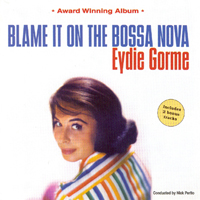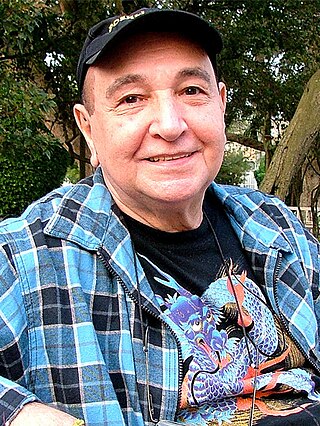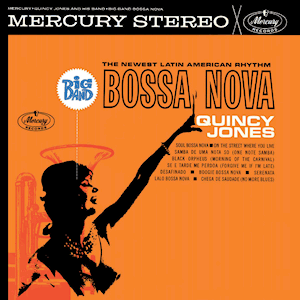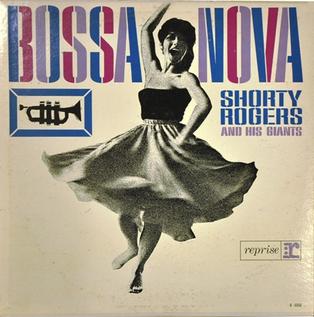Big Band Bossa Nova may refer to:
Big Band Bossa Nova may refer to:
Bossa nova is a relaxed style of samba developed in the late 1950s and early 1960s in Rio de Janeiro, Brazil. It is mainly characterized by a "different beat" that altered the harmonies with the introduction of unconventional chords and an innovative syncopation of traditional samba from a single rhythmic division. The "bossa nova beat" is characteristic of a samba style and not of an autonomous genre. The bossa nova wave became popular around the world; this increased popularity helped to renew samba and contributed to the modernization of Brazilian music in general.
Latin jazz is a genre of jazz with Latin American rhythms. The two main categories are Afro-Cuban jazz, rhythmically based on Cuban popular dance music, with a rhythm section employing ostinato patterns or a clave, and Afro-Brazilian jazz, which includes samba and bossa nova.

Stan Getz was an American jazz saxophonist. Playing primarily the tenor saxophone, Getz was known as "The Sound" because of his warm, lyrical tone, with his prime influence being the wispy, mellow timbre of his idol, Lester Young. Coming to prominence in the late 1940s with Woody Herman's big band, Getz is described by critic Scott Yanow as "one of the all-time great tenor saxophonists". Getz performed in bebop and cool jazz groups. Influenced by João Gilberto and Antônio Carlos Jobim, he also helped popularize bossa nova in the United States with the hit 1964 single "The Girl from Ipanema".
Bossa nova is a style of music.

Getz/Gilberto is an album by American saxophonist Stan Getz and Brazilian guitarist João Gilberto, featuring pianist and composer Antônio Carlos Jobim, who also composed many of the tracks. It was released in March 1964 by Verve Records. The album features the vocals of Astrud Gilberto on two tracks, "Garota de Ipanema" and "Corcovado". The artwork was done by artist Olga Albizu. Getz/Gilberto is a jazz and bossa nova album and includes tracks such as "Desafinado", "Corcovado", and "Garota de Ipanema". The last received a Grammy Award for Record of the Year and started Astrud Gilberto's career. "Doralice" and "Para Machucar Meu Coração" strengthened Gilberto's and Jobim's respect for the tradition of pre-bossa nova samba.

Jazz Samba is a bossa nova album by Stan Getz and Charlie Byrd released by Verve Records in 1962. Jazz Samba signaled the beginning of the bossa nova craze in America. Stan Getz was the featured soloist and the tracks were arranged by Charlie Byrd, who had first heard bossa nova during a tour of Brazil in 1961.
William Thomas "Keter" Betts was an American jazz double bassist.
Ethno jazz, also known as world jazz, is a subgenre of jazz and world music, developed internationally in the 1950s and '60s and broadly characterized by a combination of traditional jazz and non-Western musical elements. Though occasionally equaled to or considered the successor of world music, an independent meaning of ethno jazz emerged around 1990 through the commercial success of ethnic music via globalization, which especially observed a Western focus on Asian musical interpretations. The origin of ethno jazz has widely been credited to saxophonist John Coltrane.
"Chega de Saudade", also known as "No More Blues", is a bossa nova jazz standard. It is often considered to be the first bossa nova song to be recorded. Like "The Girl from Ipanema", the music for "Chega de Saudade" was composed by Antônio Carlos Jobim, with lyrics by Vinícius de Moraes.
"Soul Bossa Nova" is a popular instrumental, composed and first performed by musician and record producer Quincy Jones. It appeared on his 1962 Big Band Bossa Nova album on Mercury Records.

"Blame It on the Bossa Nova" is a song written by Cynthia Weil (lyrics) and Barry Mann which was a 1963 hit single for Eydie Gormé, reaching number 7 on the Hot 100 in Billboard in March 1963. The song also peaked at number 32 in the UK, whereas "Yes, My Darling Daughter" became the biggest hit for Eydie there, reaching number 10.

João Donato de Oliveira Neto was a Brazilian jazz and bossa nova pianist as well as a trombonist from Rio Branco. He first worked with Altamiro Carrilho and went on to perform with Antonio Carlos Jobim and Astrud Gilberto. Because of the area he grew up in Brasil he was able to hear Cuban music on the radio. This influence would manifest itself in many of his compositions, piano, and trombone playing. Donato's most well-known compositions include: "Amazonas", "Lugar Comum", "Simples Carinho", "Até Quem Sabe" and "Nasci Para Bailar".
"Samba de uma Nota Só", known in English as "One Note Samba", is a bossa nova and jazz standard song composed by Antônio Carlos Jobim with Portuguese lyrics by Newton Mendonça. The English lyrics were written by Jon Hendricks. It was first recorded by João Gilberto in 1960 for his album O Amor, o Sorriso e a Flor.
Rudy Collins was an American jazz drummer born in New York City.

Big Band Bossa Nova is an album by American composer Quincy Jones.

Chris White was an American jazz bassist.
William Frank Reichenbach Sr. was an American jazz drummer and percussionist, who co-developed the jazz-samba drumming style. He was the father of trombonist Bill Reichenbach Jr. and the singer Kurt Reichenbach.

Big Band Bossa Nova is a 1962 album by saxophonist Stan Getz with the Gary McFarland Orchestra. The album was arranged and conducted by Gary McFarland and produced by Creed Taylor for Verve Records. This was Getz's second bossa nova album for Verve following Jazz Samba, his very successful collaboration with guitarist Charlie Byrd.

Bossa Nova is an album by American jazz trumpeter, composer and arranger Shorty Rogers, released on the Reprise label in 1962.

Big Band Bossa Nova is a studio album by Enoch Light and His Orchestra. It was released in 1962 on Command Records. The musicians performing solos included Doc Severinsen on trumpet, Tony Mottola on guitar, Phil Bodner on woodwinds, and Bobby Byrne on trombone.